After the vote, what's changed? Not much.
Sinn Féin bottled it, as did most far-right candidates, but perhaps the biggest story is that 1 in every 2 voters did not vote in the local elections. Is that a feature or a bug of local democracy?
In the end there was not much between Fine Gael and Fianna Fáil; that’s a fair reflection of the two biggest political parties in the Republic and in Cork. Ideologically, they’re like co-joined twins, and the voters that came out, came out by and large to support them.
It’s worth noting that nationally just over 50% of voters bypassed the polling stations last Friday. The figure was almost identical for 2019. Half of all voters don’t think much of local or European politics. For many the first sight they had of a local pol or candidates was the ubiquitous and airbrushed images that adorned posters on every pole on every road in the county and city.
A few standout stats:
Sinn Féin barely registered in Cork County - out of 55 seats, they managed to get a single seat, and that came in Carrigaline.
Sinn Féin weren’t the only ones to get a kicking in the county. The Green Party registered a grand total of zero elected candidates across the 10 local electoral areas in Cork county
The average turnout across the five electoral areas in Cork city was around 45%, a few percentage points below the national average.
Voters in the city’s South East ward were responsible for a little bit of history when they voted Green Party Councillor Honore Kamegni in. A former postman, he is the first Black councillor in Cork city. It’s just dessert for Kamegni who Derek Blighe predicted would get a hammering in the local election during an encounter in which he recorded Kamegni while following him around Nemo Rangers after the referendum last March. Alas Kamegni was elected; Blighe was eliminated.
A total of 16 women were elected to fill the 55 seats in Cork County Council (29% of the total).
Five women were voted onto the City Council from a total of 31 seats. (16% of the total)
Cork City North West had the highest number of spoiled votes at 257 out of a total of 12,269 valid votes.
Sayonara
Former Lord Mayor Deirdre Forde (FG) and former deputy Lord Mayor (Collette Finn) both failed in their attempt to be re-elected, as did Lorna Bogue, one of the few councillors who could legitimately claim to understand the frustrations of using public transport in the city on a daily basis.
Wilkommen
Two new female candidates were elected onto the City Council: Michelle Gould in Cork City North West and Laura Harmon in Cork City South West (Labour). The Gould name will be familiar to many, as Michelle is married to SF TD Thomas Gould. However, her election came at the expense of her colleague’s Mick Nugent who failed to make to past the post, while in the South West Ward the party’s Joe Lynch made it through.
Elsewhere, Peter Horgan, a prolific social media user and issuer of FOI requests made it on to the City Council. Labour upped their standing to three seats, while Pádraig Rice also made it past the post for the Social Democrats, the first time they gained a seat on the City Council. One new independent was elected to the City Council, retired businessman Albert Deasy who ran on a “common sense” platform, borrowing very much from Independent Ireland mandate. Common sense is in the eye of the beholder, so we await to see what that translates to in council chambers.
Fianna Fáil have two new faces in Terry Coleman and Margaret McDonnell, while Fine Gael added no new councillors in the city.
All things being equal, this was very much a vote for the status quo. How different would it have been, especially for SF, if the turnout had been nearer what the general election turnout?
But a bigger question is, are the non-voters sending a consistent message (that’s consistently not being listened to): local politics does not move the dial enough to matter. In some respects, they are right.
Writing in T+D last year, UCC’s Dr. Aodh Quinlivan, a local democracy scholar, wrote that “…local government is under-studied, under-researched, under-analysed and under-valued.”
Dr. Quinlivan sounded a hopeful note in that piece. Voter turnout would suggest there is a long ways to go yet.
How can we strengthen local government in Ireland?
Cinderella and the Constitution I cannot claim credit for coining the phrase that local government is the Cinderella of the Irish political system. It has been used by other academic scholars before and what they generally mean is that local government is under-studied, under-researc…






When you say 'Alas' Derek Blighe didn't get elected, I presume you are joking. I'd have said 'thankfully' Derek Blighe didn't get elected. I would hate to think you have any sympathy for the likes of Derek Blighe